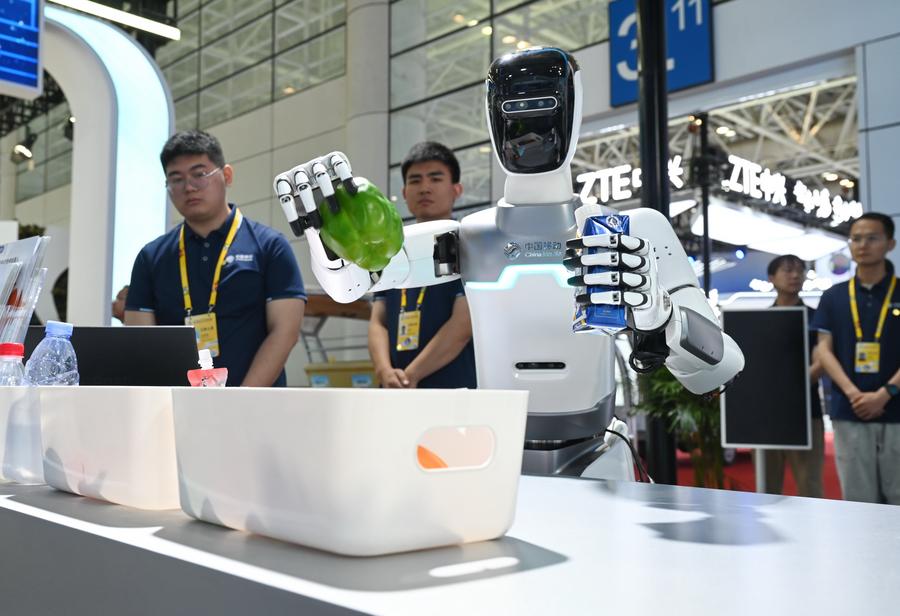Nation's digital push gaining speed, edge
Boom of advanced technologies seen as new engine for economic growth


China's emphasis on accelerating the development of the digital economy and advancing the concept of "Digital China" will give the country a competitive edge in strategic emerging sectors and safeguard global security, said officials and experts.
Emphasizing that the boom of cutting-edge digital technologies has emerged as a new engine driving China's economic growth, they called for heightened efforts to push forward the construction of digital infrastructure, bolster the deeper integration of the real and digital economies, and promote technological innovation and the application of rapidly evolving artificial intelligence in a wider range of sectors.
When delivering a keynote speech at the opening ceremony of the Second World Internet Conference in Wuzhen, Zhejiang province, in December 2015, President Xi Jinping said that China is implementing the "Internet Plus" action plan and advancing the building of a "Digital China".
In a congratulatory letter sent to the first Digital China Summit, which opened in April 2018 in Fuzhou, Fujian province, Xi called for fostering new driving forces through informatization, in order to promote new development and make new achievements.
He emphasized that digitalization, networking and the application of intelligent technologies, which have been greatly developed, are playing increasingly important roles in promoting social and economic development, modernizing China's governance capacity, and meeting the people's ever-growing needs for a better life.
This year marks the 10th anniversary of the nation's efforts to construct a "Digital China". China's digital economy has gained strong momentum in recent years, with remarkable achievements made in fields such as artificial intelligence, integrated circuits, industrial software and basic software.
The added value of core industries of the digital economy accounted for about 10 percent of GDP in 2024, while the total data output reached 41.06 zettabytes, marking a robust 25 percent year-on-year increase, according to the "Digital China Development Report 2024" released by the National Data Administration.
The report said the total scale of China's computing power reached 280 EFLOPS last year. EFLOPS is a unit of the speed of computer systems and is equal to 1 quintillion floating-point operations per second. Furthermore, it said, the country had built more than 4.25 million 5G base stations by the end of December.
"To accelerate the building of a 'Digital China', it is crucial to seize the unprecedented opportunities brought about by AI," said Liu Liehong, head of the NDA, at the recently concluded 8th Digital China Summit, highlighting the significance of advancing reforms related to the market-oriented allocation of data elements and implementing the AI Plus initiative.
Noting that data serves as a new type of production factor, Liu said that more efforts are needed to increase the supply of high-quality data, accelerate the integration of data elements with AI, technological innovation and industrial development and application, and press ahead with the construction of national computing power infrastructure.
He noted that new computing power in major computing hubs will account for more than 60 percent of the country's total by the end of this year, and called for cultivating a national integrated data market, establishing standards and systems for data circulation and transaction, and strengthening international cooperation in the digital economy domain.
Luo Zhongwei, a researcher at the Chinese Academy of Social Sciences' Institute of Industrial Economics, said, "Innovative digital technologies represented by AI, 5G, cloud computing and big data are currently finding a wide range of applications across various industries such as manufacturing, finance and healthcare, and speeding up their integration with the real economy."
Luo said that facilitating the development of the digital economy is of vital significance for nurturing new quality productive forces, propelling the intelligent transformation and upgrading of traditional industries and consolidating economic recovery momentum, in order to drive a shift from old growth drivers to new ones amid a volatile external environment and tariff pressures from the United States.
To gain an upper hand amid increasingly fierce international competition, Luo stressed the need to double down on indigenous innovation to make breakthroughs in core technologies in key fields like raw materials, precision components and high-end equipment, and expand the industrial application scenarios of advanced technologies.
In February 2023, China unveiled a plan for the overall layout of its digital development, vowing to make important progress in the construction of a "Digital China" by 2025, with effective interconnectivity in digital infrastructure, a significantly improved digital economy and major breakthroughs in digital technological innovation. By 2035, the nation is expected to be at the global forefront of digital development.
"As a new round of technological revolution and industrial transformation is evolving, promoting the in-depth integration of digital technologies with the real economy is a necessary requirement for establishing a modern industrial system and a strategic choice of forging new competitive advantages on the global stage," said Pan Helin, a member of the Ministry of Industry and Information Technology's Expert Committee for Information and Communication Economy.
The move to develop the digital economy is conducive to enhancing the resilience of industrial and supply chains, advancing new industrialization and realizing Chinese modernization, Pan said.
He added that a bigger push is needed to reinforce the dominant position of enterprises in boosting sci-tech advancements, increase financial support for innovation-oriented tech companies, and strengthen the training of high-caliber talent.
Wu Jianping, an academician at the Chinese Academy of Engineering, said the emergence of state-of-the-art digital technologies has laid a solid foundation for unleashing the value of massive data elements, which underscores the significance of safeguarding data security, a prerequisite to ensuring the orderly development of the data industry.
AI seen as key
AI, which has entered a stage of explosive growth, is spearheading the development of the digital economy and is being integrated into every facet of industrial revolution and people's lives.
Robin Li, co-founder and CEO of Chinese tech giant Baidu Inc, said that the application of AI technology is reshaping the industrial landscape and will be a transformative force that revolutionizes development over the next 40 years.
Li said the goal of the intelligent transformation of industries and society through AI is to fulfill people's needs — making technology meaningful only if it serves humanity by creating more value and contributing to society.
Zhou Hongyi, founder of Chinese internet enterprise 360 Security Group, said: "Looking ahead, the growth potential of China's economy will come from industrial upgrading driven by technological innovation, while AI represented by large language models will give birth to new production and business models in traditional fields such as manufacturing, agriculture and services, creating more social value."
Zhou said 360 Security Group will focus on digital security and AI, adding that it is important to promote the digital transformation of micro, small and medium-sized enterprises, as they face mounting pressure from a shortage of capital, talent and technology.
Denis Depoux, global managing director of market consultancy Roland Berger, said, "China has made rapid progress in the development of AI technology, becoming one of the global leaders, and the pace will further accelerate. AI will unlock massive opportunities for our business."
Foreign companies can play a bigger role in supporting China's transformation in fields such as decarbonization and the digitalization of industrial and supply chains, he added.




































